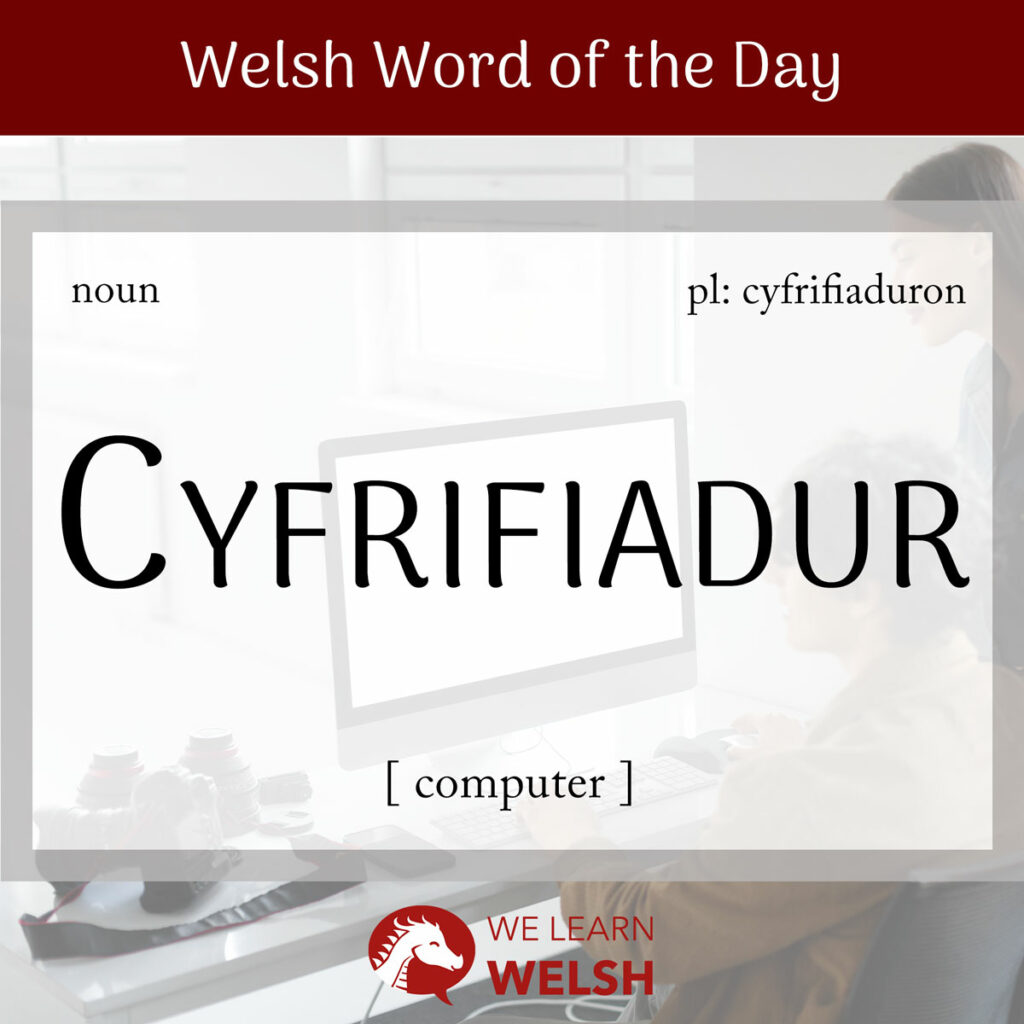Way back in the day before cyfrifiaduron (computers), I would have had to ysgrifennu (writing) this erthygl (article) with papur (paper), ysgrifbin (pen) and a geiriadur (dictionary). Now that I have a cyfrifiadur (computer) for ysgrifennu and ymchwilio (researching), things are much more convenient!
cyfrifiadur
a computer
cyfrifiaduron
computers
Cyfrifiadur is a masculine noun. It comes from the combination of cyfrif (to count, among other things) with the suffix –iadur, the same found in words like geiriadur and dyddiadur (diary).
Cyfrif has given us quite a few other Welsh words, not least cyfrifiannell (calculator), which is a classic culprit for getting mixed up with cyfrifiadur. Plus there’s cyfrifydd (accountant), cyfrifol (responsible) and cyfrifiad (computation / calculation).
And cyfrifiadur itself is the ancestor of words such as cyfrifiadureg (computer science), cyfrifiadurwr (computer scientist) and cyfrifiadurol (to do with computers). There are quite a few phrases in English which use computer as an adjective, and for these in Welsh we’d use cyfrifiadurol. Examples include graffeg gyfrifiadurol (computer graphics) and astudiaethau cyfrifiadurol (computer studies).
The word is subject to all three kinds of mutation.
Soft mutation
gyfrifiadur
Nasal mutation
nghyfrifiadur
Aspirate mutation
chyfrifiadur
Take the phrases:
- hen gyfrifiadur (old computer)
- fy nghyfrifiadur (my computer)
- cyfrifiannell a chyfrifiadur (a calculator and a computer)
Cyfrifiadur is the only word in modern standard Welsh for a computer as in the peiriant (machine). The usage of the English computer to refer to a person who computes is archaic, but if you did want to convey that meaning, you’d need to use the word cyfrifwr (one who counts).
On a basic level, a cyfrifiadur is a peiriant that requires rhaglennu (programming) to work with gwybodaeth (information).
A fold-up portable cyfrifiadur is a gliniadur (laptop). The Welsh word, gliniadur, comes from combining the –iadur suffix with gliniau (knees), so it’s almost a calque from the English.
Mae rhaid i fi brynu cyfrifiadur newydd cyn i’r un ‘ma torri.
I have to buy a new computer before this one breaks.

Cyfrifiaduron are composed of system weithredu (an operating system), additional meddalwedd (software), caledwedd (hardware). On the traditional cyfrifiadur personol (PC) that comes to mind when most people hear the word cyfrifiadur, the caledwedd consists of a monitor (monitor) with sgrîn (screen), bysellfwrdd (keyboard), and llygoden (mouse).
There may also be further offer (equipment) the defnyddiwr (user) may prefer to employ to make using the cyfrifiadur easier. For example, I use a gliniadur (laptop) for my gwaith (work); gliniaduron don’t normally come with a llygoden, but you can plug one in. Ever since I started using one instead of the bysellbad (keypad) I find it impossible to work without it!
But today, a huge range of devices in everyday use are technically cyfrifiaduron, from ffonau clyfar (smartphones) and consolau gemau (games consoles) to even the humble meicrodon (microwave). Plus it’s cyfrifiaduron that power the rhyngrwyd (internet) that has become such a huge part of so many people’s lives.
Dywedodd hi fod y cyfrifiadur yn glitshio.
She said the computer was glitching.
I’m sure there are a lot of types of cyfrifiaduron that I haven’t even heard of! Technoleg (technology) is always an interesting one for linguistics, because most cyfrifiadureg-related vocabulary is first developed in English.
That means other languages like Welsh have to figure out whether to use the English as a loan word or to develop their own new vocabulary.
In Wales, we actually have y Ganolfan Safoni Termau (Centre for the Standardization of Welsh Terminology) at Prifysgol Bangor (Bangor University) which is an important part of this process – though of course a lot of developing new words and phrases happens at a grassroots level. You can use their affiliated gwefan (website) Porth Termau to search for words you might not find in all geiriaduron, especially those relating to new technoleg.
So developing new specialist geirfa (vocabulary) and jargon in Welsh is a two-part process: a few talented terminolegwyr (terminologists) develop the geiriau (words), and then it’s up to us to keep those geiriau alive.

